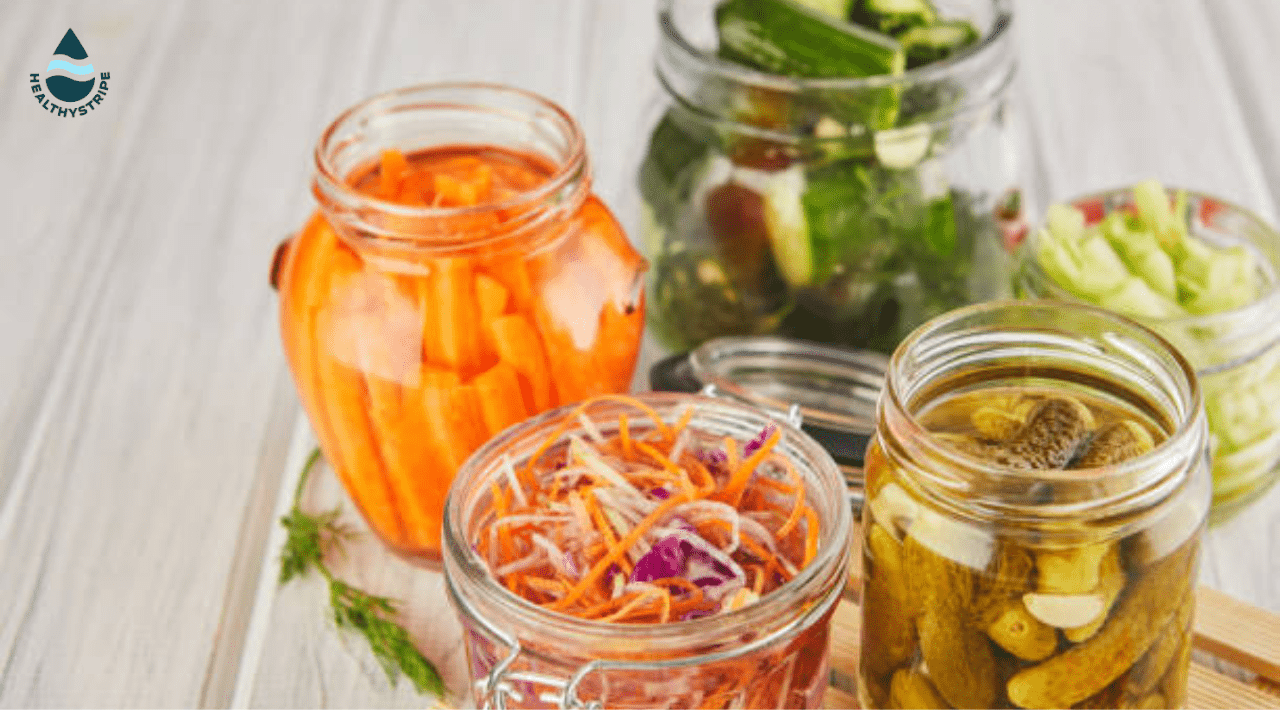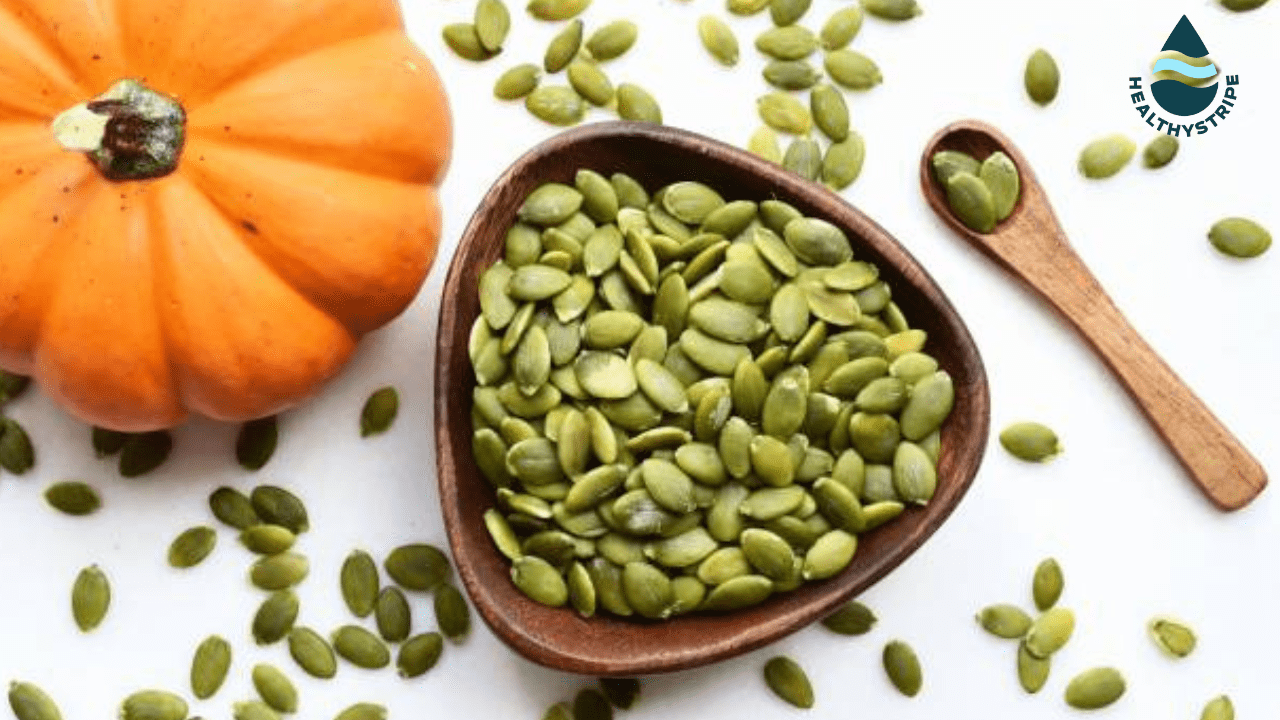Fermented Foods: Foods and Top benefits and How it Works?

Fermented foods are quickly catching up as a mantra to maintaining overall health, so much so that they are becoming a kitchen staple and a compulsory addition to the everyday meal menu. In fact, fermented foods comprise nearly 5 to 40% of diets across many countries.
Popular fermented food options include kombucha, kefir, kimchi, miso, sauerkraut and pickles to name a few.
This comprehensive guide on fermented foods will take you through the complete fermented foods list and benefits and how can make the most out of these foods to maximize your health.
Understanding Fermented Foods
The concept of fermented foods is not new. The consumption of these foods has been an integral part of history and culture in almost every nation around the globe. The earliest recorded history of consuming fermented foods dates back to 13000 BC.
The process of fermentation started as a preservation method for various food groups such as fruits, vegetables, meats, and milk. Since most of these foods were seasonal or had a short shelf-life, the goal was to extend their life to the seasons or times when these foods would not be available.
The earliest forms of fermented foods included alcoholic drinks such as beer and wine, milk products such as cheese, and food products such as breads, and pickled vegetables and fruits. Different cultures had different forms of fermented foods. For example, Indians had their pickles,
Koreans were famous for their kimchi while Germans had their sauerkraut.
Today, though, the intent and purpose of consuming fermented foods has changed drastically.
The benefits of fermented foods are many. According to an article published in the journal “Nutrients”, fermented foods can boost your immune system, improve gut health, and exert a positive influence on cardiovascular and nervous systems.
How Does Fermentation Work?
This process involves the simple conversion of sugars and carbohydrates present in foods into alcohols or acids by the presence or bacteria or yeast. The fermentation process serves two purposes apart from aiding in preservation.
- The conversion of sugars and carbs into alcohol and acids renders tartness and tanginess to foods making them more flavorful. The texture also changes in the process.
- The fermentation process also promotes the growth of beneficial bacteria known as probiotics which make fermented foods beneficial for gut health
Top 10 Foods For Healthy Gut
Fermented foods and gut health are closely related. The lactic acid bacteria that result in the formation of probiotics in fermented foods can have many benefits as per this research article published by Frontiers Journal. Adding fermented foods to your everyday meal plan can be beneficial in many ways.
Here is the top 10 list of fermented foods to eat for your gut health.
1. Kefir
The word Kefir means “feel-good” and kefir drink is quite popular in Russia. This milk drink is fermented by adding kefir seeds (bacteria and yeast granules) to milk. This drink can be made from cow, sheep, or goat milk. The non-dairy version is made with coconut water or coconut milk.
This drink is a rich source of B-complex vitamins, protein, and calcium. In fact, kefir drink is known to be a superior source of probiotics when compared to yogurt and tops our list of fermented foods for gut health.

2. Kimchi
Kimchi refers to fermented or pickled vegetables and finds its origins in Korea. While many vegetables are used in the fermentation process, radish and Napa Valley cabbage are the most common ones.
The fermentation process is encouraged by the formation of lactic acid bacteria. As a result, kimchi is a rich source of vitamins such as B12, C, and K and phytochemicals apart from being a probiotic.
A wide range of clinical studies conducted on around 638 participants show that kimchi can improve obesity by reducing body fat lowering cholesterol and improving the lipid profile. Intake of kimchi is also associated with improved blood glucose levels and better immunity.
3. Miso
Miso or fermented Soybean paste is a traditional Japanese ingredient and is a popular seasoning ingredient and is also consumed as a soup. An ingredient named Koji is used to ferment rice, barley or soybean to derive miso paste.
This fermented side dish is rich in proteins, amino acids, isoflavones and vitamins E and K and is known to possess anti-cancer properties.
4. Yogurt
Yogurt is an extremely popular and readily available probiotic food and is derived mainly from milk. The culture added at the optimal temperature and left to set results in the development of beneficial bacteria that turn the milk into yogurt.
There are different variants of yogurts, probiotic yogurts, fruit yogurts, and lactose-free yogurts to meet different requirements.
Yogurt improves lipid and blood glucose profiles and blood pressure and leads to better bone health and gut health.
5. Kombucha
Kombucha is a sweet and fizzy drink prepared by fermenting black tea with bacteria and yeasts. The origin of this drink can be traced back to China where it was a traditional drink. Later this drink got popular in Russia and Europe.
The fermentation process, while promoting the growth of beneficial bacteria, also kills any harmful bacteria, making this drink safe to consume. The popularity of this drink can be attributed to its antioxidant and anti-inflammatory properties along with its probiotic qualities.

Kombucha: Review – ScienceDirect
6. Sauerkraut
Sauerkraut is a kind of pickled cabbage that originated in China and is the national dish of Germany. Finely chopped raw cabbage is fermented with lactic acid bacteria. This fermentation process gives a distinct sour taste and preserves the cabbage.
Sauerkraut is high in vitamin C, minerals and phytochemicals.
7. Tempeh
Tempeh is a cake-like fermented product made by fermenting cooked soybeans using a starter and then molded into a block form. This is a traditional Indonesian food.
Tempeh is high in protein, essential fatty acids, minerals, and vitamins. The soy protein content reduces the risk of cardiovascular diseases and helps lower blood cholesterol and LDL levels.
As per the FDA, an intake of 25 gm of soy protein a day can reduce the risk of heart disease. Additionally, intake of soy protein also improves bone health and reduces the risk of osteoporosis.
8. Buttermilk
Traditionally, buttermilk refers to the liquid that is left behind during the process of separating or churning out butter from milk cream. Buttermilk differs from other fermented foods in the sense that no external starter cultures are added and the fermentation happens from within. This makes buttermilk unique and a healthier fermented food option.
Buttermilk is known to have hypocholesterolemic properties which results in the lowering of cholesterol and LDL levels with regular consumption. A controlled study conducted on 100 participants aged between 18 to 65 years for a period of 12 weeks showed a lowering in cholesterol and LDL levels among the subjects.
Buttermilk also exhibits anti-cancer properties.
9. Natto
Natto is a traditional Japanese fermented food made from soybeans. Whole soybeans are soaked overnight, steamed, and fermented using bacteria. The fermentation process renders a sticky stringy nature to this fermented food which is often eaten with rice.
This fermentation process increases the bioavailability of rich nutrients such as proteins, vitamins, and minerals.
Therapeutic properties of Natto include anti-cancer properties, anti-inflammatory properties, and hypocholesterolemic effects. A research study conducted on animals shows that fermented soybean paste exhibits various anti-allergic effects.
10. Kvass
Kvass is a fermented beverage made from rye bread or beets and is slightly alcoholic in nature due to the presence of very mild alcohol levels that result from the fermentation process.
This drink, apart from being a rich source of probiotics, is also rich in vitamins B12 and C, amino acids, magnesium, and phosphorus.
Kvass is known to reduce gastric disturbances such as acidity. A research study conducted on rats shows that consumption of this fermented food can improve gastrointestinal functioning and the occurrence of conditions such as functional dyspepsia. This drink also improves metabolism.
Top 6 Benefits of Fermented Foods

Fermented foods have always been a part of food culture in many countries, but it is only now that we are realizing the many health benefits of these unique tasting and textured foods.So, how are fermented foods good for you? Here are some of the health benefits of fermented foods.
1. Immunity
Fermented foods are a rich source of vitamin C and antioxidants. The presence of these components make fermented foods an excellent source for improving your immunity levels. But if you have an immuno-compromised system, fermented foods may not be right for you.
2. Gut Health
Fermentation is carried out by bacteria or microbes present in the fermented foods. When these good bacteria enter your stomach, they ensure proper digestion and better functioning of the digestive system. As a result, you will experience improved digestion and overall improved gut health.
3. Bio-availability
The fermentation process ensures increased bioavailability of certain nutrients. This means that these nutrients will be readily available and absorbed by the body leading to an overall improvement in health.
4. Improvement in Lactose Tolerance
Lactose intolerance is a widely prevalent condition where certain individuals develop an intolerance to milk and milk products. This happens when their digestive system is unable to process the lactose component. Regular intake of fermented foods can have a positive impact on the gut and improve the digestion of lactose.
5. Relief From Gut-Related Conditions
Individuals suffering from gut-related auto-immune conditions such as Irritable Bowel Syndrome or IBS and Crohn’s disease can find some relief from symptoms such as diarrhea and upset stomach with the regular consumption of fermented foods that are rich in probiotics. But such individuals must consult their specialist and get a go-ahead before trying out these foods.
6. Reduced Inflammation
Individuals suffering from inflammations due to chronic and auto-immune conditions can find relief from the symptoms with regular consumption of fermented foods.
Who Should Not Eat Fermented Foods?
Fermented foods may be good for your gut. But it may still be unsafe for certain groups of people to consume them. Talk to your doctor before trying fermented foods if you fall into the following categories.
1. Compromised Immune Systems
If you are undergoing radiation or chemotherapies or are under immunosuppressant drugs due to any underlying medical conditions, you must avoid fermented foods.
The bacteria or microbes present in fermented foods may adversely react with your system and cause you to fall sick when your immune system is compromised.
2. Digestive Disorders
People with digestion problems such as bloating and diarrhea may need to avoid fermented foods till the condition resolves. Those going through flare-ups with conditions such as IBS may also need to avoid certain fermented foods since certain microbes and bacteria may increase diarrhea and other digestive disorders.
Taking the doctor’s advice is always preferable on whether you can continue consuming fermented foods when having digestive issues.
3. Histamine Intolerance
Fermented foods are generally high in histamine since bacteria and microbes are involved in the process of fermentation. Individuals with histamine intolerance cannot break down histamines and may suffer allergic reactions.
Such reactions may include skin allergies such as itching and hives, digestion issues, nausea, headaches, and more.
But all types of fermented foods need not be avoided. Certain fermented foods low in histamines can be consumed without any issues.
Conclusion
To sum up, fermented foods are an excellent addition to your everyday diet, especially if you are looking at natural ways to improve your overall health. Fermented foods such as pickles can easily be made at home if you learn and follow the right techniques.
Do ensure to talk to your doctor if you have any underlying health conditions and want to make fermented foods a part of your everyday diet.
How Often Should You Eat Fermented Foods?
How Much Fermented Food Should You Eat?
You can start with one or two small portion servings of fermented foods in a day. Once your body adjusts to this intake you can slowly increase the quantity. Ideally, you can have 2 to 3 small servings of fermented foods everyday.
Can I Eat Fermented Foods Everyday?
You can eat fermented foods everyday as long as you do not have any underlying conditions that may cause your body to react adversely to these foods or experience allergic or adverse reactions.
What Vegetables Should Not Be Fermented?
Almost every vegetable contains lactic acid and can be safely fermented including green leafy vegetables.









